Latest News
MICROCON research in The Economist
24/10/2011

The Economist
Research by MICROCON Director Patricia Justino has been referenced in an Economist article, both online and in print. The article, 'Unrest in peace: protests in the West have roots beyond bouts of austerity', refers to arguments elaborated upon in MICROCON Research Working Paper 3: Carrot or Stick? Redistributive Transfers Versus Policing in Contexts of Civil Unrest.
MICROCON researchers' Blog on Gadaffi
08/09/2011
![]()
MICROCON researchers Frédéric Deycard and Yvan Guichaoua have published a blog on the African Arguments website, discussing the mobilisation of pro-Gadaffi mercenaries from neighbouring countries, including Niger and Mali. You can read the blog here.
MICROCON researchers' FT article
26/07/2011

MICROCON researchers, Debby Guha-Sapir and Peter Louis Heudtlass wrote a brief article on humanitarian funding and food security early warning systems, published in the Financial Times. Read the article here.
Final MICROCON Conference
30/06/2011-01/07/2011
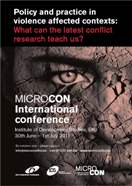 Microcon conference poster
Microcon conference poster
The MICROCON programme held a two-day conference at the Institute of Development Studies, between 30 June - 1 July for approximately 70 participants to debate, learn and share the latest in research, policy and practice concerned with the micro-level analysis of conflict.
In addition to presenting the latest advances in research, the conference will focus on six thematic areas in order to explore micro-level conflict in relation to i) empirical advances ii) household strategies for navigating violent conflicts iii) health outcomes iv) individual perspectives on violent conflict v) poverty, inequality and exclusion and vi) insitutions and governance. Visit the conference web page.
Yvan Guichoua interviewed on openDemocracy
06/05/2011
 Politics website openDemocracy
Politics website openDemocracy
MICROCON researcher Yvan Guichaoua has been interviewed on the openDemocracy website about the organisation 'Al Qaida in the Islamic Maghreb'.
In the interview he describes the origins of the organisation and how it has prospered through combining smuggling and demanding ransoms with ideology. You can listen to the interview here.
MICROCON members involved in World Development Report 2011
10/12/2010
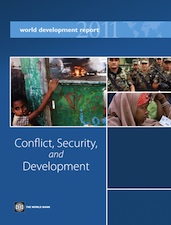 World Development Report 2011
World Development Report 2011
MICROCON researchers made a number of contributions to the preparation of the 2011 World Development Report, whose theme is Conflict, Security and Development. The preliminary findings were reported by Nick van Praag at the European Development Days on 6 December, and MICROCON Director Patricia Justino was the discussant for the session.
Patricia, Tilman Brück, Philip Verwimp and Alexandra Adveenko have authored a background paper for the report entitled, 'Identifying Conflict and Violence in Micro-Level Surveys' (available here, and forthcoming as a MICROCON Research Working Paper).
Debarati Guha-Sapir has co-authored an input paper on the Demographic and Health Consequences of Civil Conflict.
In addition, Philip Verwimp is directing a project on Gender and Conflict, funded by the World Bank. The project consists of empirical analysis of six case studies looking at gender-differentials in conflict outcomes. The project aims to gain recognition of and muster support for a gendered approach in programs targeted at populations in conflict areas. Some of the papers from the project are being used for the 2011 WDR, and some will be used for the 2012 WDR on Gender Equality and Development.
Ana María Ibañez and Andrés Moya publish chapter in volume on crime in Latin America
15/10/2010
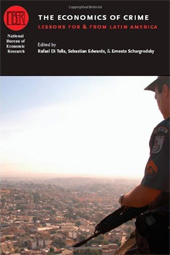 'The Economics of Crime'
'The Economics of Crime'
Ana María Ibañez and Andrés Moya have published a chapter in a new volume entitled, 'The Economics of Crime: Lessons for and from Latin America'. Crime rates in Latin America are among the highest in the world, making crime the primary concern of many citizens. The collection contributes to the current debate on causes and solutions by applying lessons learned from recent developments in the economics of crime.
Ana María and Andrés' chapter looks at how asset losses occur during internal conflicts and the process of asset accumulation following the initial shock, particularly looking at displaced populations. A previous version of the chapter was published as MICROCON Research Working Paper 10: Do Conflicts Create Poverty Traps? Asset Losses and Recovery for Displaced Households in Colombia.
Call for papers issued on the Global Costs of Conflict
20/09/2010
MICROCON partner, the German Institute for Economic Research, along with the Households in Conflict Network and the German Foundation for Peace Research, are organising a workshop on the Global Economic Costs of Conflict. The workshop will take place in Berlin from 19-21 January 2011.
The Call for Papers is now available, and papers are welcomed on the global costs of conflict, as well as on other themes relevant to the analysis of mass violent conflict. The deadline for paper submissions is 1 November 2010.
Yvan Guichaoua article on Al Qaeda in the Sahara published in Libération
26/08/2010
 Libération
Libération
Yvan Guichaoua has written an article for the French newspaper Libération, which discusses the development of Al-Qaeda's operations in the Sahara, known as 'Al-Qaeda au Maghreb islamique' (Aqmi). He reflects on how the Al-Qaeda group relates to the local population, and Touareg militants in the area. He argues that the area is particularly difficult to police due to the failure of governments in the region to address the grievances of local populations and the structural problems underlying the Touareg rebellion.
The article is available here.
Burundian government publishes report on a national household survey co-financed by MICROCON
30/03/2010
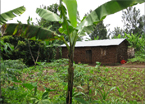
A rural dwelling in Burundi
The Institute of Statistics and Economic Studies of Burundi (ISTEEBU) has published a report on a national household survey undertaken in 2007 under MICROCON project 15: Civil war and activity choice. The survey formed part of a panel, reinterviewing households originally interviewed for a national household survey in 1998. This allows the analysis of the effect of civil war on household consumption over time. 'Split-off' households - those formed by members who left the original households - were also interviewed.
The survey found that over the nine-year period of the study, poverty of individuals decreased by four per cent. It also found that poverty is persistent while prosperity is not - only 25 per cent of poor rural households managed to escape poverty in nine years. The main finding on effects of the civil war was that 25 war-related deaths at the village level decreased consumption growth by 9 per cent, whereas membership of rebel groups increase consumption.
The survey was a collaboration between ISTEEBU and a team of researchers from a consortium of the University of Antwerp (Belgium), the Free University of Brussels (Belgium) and Wageningen University (The Netherlands). The survey, which provided the data used in the report was financed from three sources: the European Union, through MICROCON; the United States Institute of Peace, through a research grant and the Netherlands Organisation for Scientific Research (NWO).
The report can be downloaded in the English version and the French version.
MICROCON researchers find that disease was the biggest killer in Darfur
15/02/2010
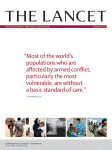
The Lancet
A study by MICROCON researchers Olivier Degomme and Debarati Guha-Sapir has found that about 300,000 people died due to the six-year Darfur conflict. Disease is estimated to have caused at least 80 per cent of these deaths.
The study covered the period from 2003-2008, and whilst there was a significant fall in mortality from early 2004 to the end of 2008, the reduction was more pronounced in violence-related mortality than in diarrhoea-related mortality. This result is probably associated with forced displacement of large numbers of people, as the overcrowded and unsanitary conditions in which displaced people live increase the risk of death from contagious diseases.
A further, and important, finding of the paper is that the mortality rate increased when there was a lower ratio of humanitarian workers to displaced people. Adequate humanitarian assistance to prevent and treat potentially fatal diseases is therefore vital, and the expulsion of non-governmental organisations from Darfur is likely to have serious consequences.
The study was published in the Lancet, and a more detailed version will be published by MICROCON later this year.
Institute for Social Studies holds conference on Understanding Peace, Conflict and Violence
22/12/2009
MICROCON partner, the Institute of Social Studies, held a conference this month entitled, 'Understanding Peace, Conflict and Violence: Do We Need New Approaches'. The keynote speaker was Professor Johan Galtung, followed by sessions on Religion, Gender and Learning from Experiences of War and Peace.
This conference was organized to mark the integration of the International Institute of Social Studies with Erasmus University Rotterdam (EUR).
Adam Cooper publishes paper on xenophobic violence in Cape Town
12/11/2009
Adam Cooper has published a paper entitled, '“Let us eat airtime”: youth identity and ‘xenophobic’ violence in a low-income neighbourhood in Cape Town'. The paper is based on a study which used qualitative methods to explore these youths’ perceptions of different groups who live in Dunoon, descriptions of how these groups interact in daily community life and accounts of what transpired in May 2008.
Adam is a researcher on project 21: Poverty, Violence and Exclusion in South Africa.
Workshop on the fate of the Jews in Germany, 1933-45
12/11/2009

The 'Young Academy'
The Junge Akademie and DIW Berlin are organising a German-language workshop on the fate of the Jews in Germany from 1933-45, involving interdisciplinary discussion of methods and micro-level questions. It will take place on 3 December 2009.
Download the workshop programme
International Research Workshop on the Global Costs of Conflict
21/10/2009
The Households in Conflict Network and MICROCON partner the German Institute for Economic Research are organising an International Research Workshop on calculating the costs of conflict and related themes. The purpose of this workshop is to bring together researchers from different institutes and to compare cutting-edge theoretical, empirical and methodological research on how to calculate the costs of conflict. Other papers of relevance to the micro-level analysis of mass violent conflict are also welcome.
The workshop will take place at the German Institute for Economic Research on 1-2 February 2010. The Call for Papers is now available, and the deadline for submissions is 1 December 2009.
International Day of Peace: Monday, 21st September 2009
21/09/2009

The United Nations' International Day of Peace takes place on 21st September each year. It is a global holiday when individuals, communities, nations and governments highlight efforts to end conflict and promote peace. It was established by a United Nations resolution in 1981 to coincide with the opening of the General Assembly.
To coincide with this day, we have published a Policy Briefing entitled, 'How Can We Prevent Violence Becoming a Viable Political Strategy?' It outlines some of the preliminary findings of MICROCON's research on the eruption of violence, and discusses their implications for policies aiming at maintaining peace.
Tilman Brück to chair session on 'Violent Development', at Germany Day on Development at the World Bank
17/09/2009
Tilman is chairing a session entitled, 'Conflict and Crisis: Violent Development' at the German Day on Development at the World Bank on 21 October. The session will include the following papers
- 'Violent Development: Recent Advances in Understanding the Behavioural-Foundations of Violent Conflict' - Tilman Brück
- 'Calculating the Global Economic Costs of Conflict' - Olaf de Groot
- 'Time Allocation, Gender and Norms: Evidence from Post-Genocide Rwanda' - Kati Schindler
- 'Conflict and Self-Employment in Colombia' - Nina Wald
The German Day of Development is being Hosted by Michael Hofmann, Executive Director for Germany at the World Bank, and organized by the Institute for the Study of Labor (IZA), the German Institute for Economic Research (DIW Berlin), and DIW DC. The day is intended to provide an opportunity to discuss research results of leading German research institutes on development issues and to enhance collaboration and communication between researchers in Washington and in Germany.
Nathalie Tocci co-edits book on the Cyprus conflict
01/09/2009

Cyprus: A conflict at the crossroads
Nathalie has co-edited a book with Thomas Diez, entitled 'Cyprus: a conflict at the crossroads'. The volume includes essays by scholars from a number of disciplines, aiming to provide fresh perspectives on the long-standing issues in the Cyprus conflict and its resolution.
The four parts of the book deal first with domestic determinants of the conflict and its resolution, then with external influences, before comparing Cyprus to other conflict cases and finally including approaches beyond political science.
Timothy Raeymaekers publishes article on economic opportunities and governance
13/07/2009
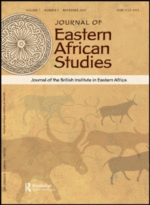
Journal of East African Studies
Timothy has published a paper entitled 'Economic opportunities and local governance on an African frontier: the case of the Semliki Basin (Congo-Uganda)' in the Journal of East African Studies. The paper is co-authored with Luca Jourdan, and discusses the border area as a space where new forms of governance emerge, challenging ruling conventions about what politics is and where it is to be found.
Timothy is a researcher on project 25, 'Governance without government?'
Philip Verwimp, Patricia Justino and Tilman Brück co-edit Special Issue of Journal of Peace Research
20/05/2009
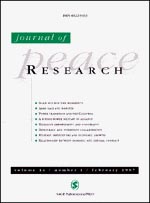
Journal of Peace Research
Philip, Patricia and Tilman have co-edited a special issue of the Journal of Peace Research entitled, 'the Micro-Level Dynamics of Violent Conflict'. While most analyses of conflict typically adopt a regional, national or global perspective, often using country-level data, the special issue takes an explicit micro-level approach, focusing on the behaviour and welfare of individuals, households and groups or communities.
The contributors to the special issue investigate the nature of violence against civilians, the agency of civilians during conflict, the strategic interaction between civilians and armed actors, the consequences of displacement, the effectiveness of coping strategies and the impact of policy interventions. The core message from the articles is that in order to understand conflict dynamics and their effects on society, we have to take seriously the incentives and constraints shaping the interaction between the civilian population and the armed actors.
The issue includes articles by MICROCON researchers Tom Bundervoet, Carlos Bozzoli, Ana María Ibáñez and Andrea Velasquez.
Anne Hatløy and Ingunn Bjørkhaug publish paper in Global Public Health
24/02/2009
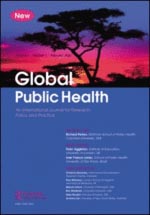
Global Public Health
Anne Hatløy and Ingunn Bjørkhaug have published an article on 'respondent driven sampling' (RDS) in the journal Global Public Health. RDS is a sampling methodology that involves the provision of incentives to respondents to recruit more participants to the study.
The article describes the implementation of this methodology in a study conducted in Kono District, Sierra Leone. It was used to identify children, under the age of 18 years old, working in the diamond sector of Sierra Leone. This includes children working directly as diamond miners as well as children working in the informal sector connected to the diamond field. The article argues that RDS is a suitable method for a rapid approach to a population that is unidentified in size and demonstrates how RDS can reach a study population within a limited period.
RDS is also being used by Ingunn in project 4: Recruiting child soldiers: vulnerability, agency and reintegration.
MICROCON scholars write articles for a symposium on the Economics of Conflict
03/02/2009
The Economics of Peace and Security Journal (EPSJ) has published a symposium on the Economics of Conflict. Guest editor Philip Verwimp introduces the symposium which consists of four articles written by MICROCON scholars Mansoob Murshed and Ana María Ibáñez as well as by Indonesian scholars Mohammed Zulfan Tadjoeddin and Anis Chowdhury and by Steven Spittaels and Filip Hilgert, researchers with the Belgian NGO International Peace Information Service.
Tilman Brück's new book on post-conflict reconstruction launched at DIW Berlin
16/01/2009
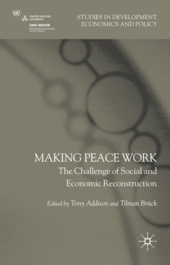
Tilman Brück and Tony Addison's new book: 'Making Peace Work'.
Tilman Brück and Tony Addison launched their new book "Making Peace Work: The Challenges of Social and Economic Reconstruction” at DIW Berlin this week. In the seminar, which was co-hosted by the United Nations Association of Germany, the editors of the volume provided insights into some of the main issues that arise in post-conflict economic and social reconstruction, and offered examples of what works, and what does not.
They stressed the need for equally promoting peace, participation and prosperity in developing countries emerging from war, and to pay attention to justice and distributional issues in reconstruction. The volume discusses these issues in a series of topical chapters on subjects ranging from ethical debates and horizontal inequality to fiscal issues and health system rehabilitation.
Addison and Brück stressed in their presentations the need for developing local capacities and achieving quick wins, in part to spoil the spoilers of peace. Dr. Beate Wagner, General Secretary of the United Nations Association of Germany who chaired the meeting, echoed this sentiment by calling for greater consistency and coherence in post-war reconstruction. The presentations were followed by a lively debate with an audience of over forty participants from academia, government and civil society.
